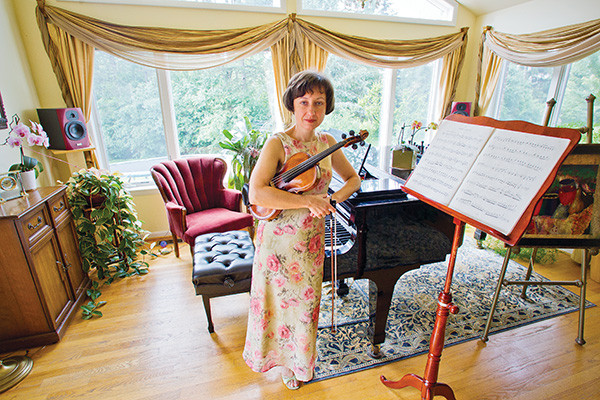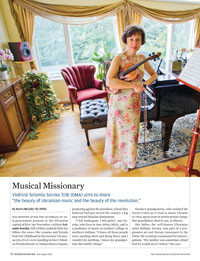Alumni Gazette
 MAGICAL MUSIC: “Magical” was how one musician described Soroka’s performance of Ukrainian music in Goshen, Ind. The concert brought awareness of events in Ukraine and support for the injured. (Photo: Tony Ding/AP Images for Rochester Review)
MAGICAL MUSIC: “Magical” was how one musician described Soroka’s performance of Ukrainian music in Goshen, Ind. The concert brought awareness of events in Ukraine and support for the injured. (Photo: Tony Ding/AP Images for Rochester Review)For months after the outbreak of anti-government protests in the Ukrainian capital of Kiev last November, violinist Solomia Soroka ’03E (DMA) could do little but follow the news. Her cousins and friends from her childhood in the western Ukrainian city of Lviv were standing in Kiev’s Maiden Nezalezhnosti, or Independence Square, protesting against the president, whom they believed had just moved the country a big step toward Russian domination.
“I felt inadequate. I felt guilty,” says Soroka, who lives in Ann Arbor, Mich., and is a professor of music at Goshen College in northern Indiana. “I knew all these people were standing there and dying there, and I couldn’t do anything. I knew my grandparents did similar things.”
Soroka’s grandparents, who resisted the Soviet Union as it tried to annex Ukraine in 1944, spent years in Soviet prison camps. Her grandfather died in one, in Siberia.
Her father, the well-known Ukrainian artist Bohdan Soroka, was part of a progressive art and literary movement in the 1960s. He would get summoned for interrogations. “My mother was sometimes afraid that he would never return,” she says.
And when she was a girl growing up in Lviv, Soroka recalls a day when Soviet KGB agents arrived at her family’s home and prevented her from leaving for her violin lesson until they inspected the inside of her violin.
“They were looking for anti-Soviet propaganda,” she says. “They knew we didn’t have any. We never had any. It was just to make people afraid, to let you know that you were being watched.”
Following the outbreak of violence, Soroka’s first instinct was to help raise money to support injured Ukrainians. But she quickly realized that her talents as a musician gave her a special means to attract public attention to Ukraine. It was, after all, a project that she and her American husband, pianist Arthur Greene, have been undertaking for several years.
Among the eight CDs Soroka has recorded, four are on the Toccata Classics label. The label was founded in London in 2005 by music journalist Martin Anderson to record and promote, in one critic’s words, “forgotten music by great composers [and] great music by forgotten composers.” In 2012, Soroka and Greene recorded music for violin and piano by Myroslav Skoryk, the most famous living Ukrainian composer who, like Soroka, was born in Lviv, but who grew up in Siberia, where his family, like Soroka’s grandfather, had been exiled by the Soviets.
This year, Soroka and Greene recorded a CD of music by 19th-century Ukrainian composer Mykola Lysenko. Lysenko was also an ethnomusicologist, and his goal was to create music that was authentically Ukrainian, rather than mimic other European composers. In Soroka’s view, Lysenko is among the most important classical composers of the 19th century, but never recorded in the West, due to Russian, and later, Soviet, domination of Ukraine’s cultural resources.
Soroka and Greene were recording Lysenko’s music in February, right as the worst violence up until that time was taking place. “I thought it would be so great if along with somehow helping, I could also introduce Ukrainian music to American people,” she says.
Soroka and Greene created an all-Ukrainian program and performed for audiences in Goshen, Ann Arbor, Detroit, and Toronto last spring before heading to Ukraine for the summer.
“It was really a magical evening,” says Beverly Lapp, chair of Goshen College’s music department, about the performance at the college in March. Although Goshen, a town of only about 30,000 people, boasts a community of several hundred Ukrainians, the concert drew a cross section of the town, according to Lapp.
“It was a packed house. Solomia spoke so beautifully about the composers,” Lapp says. “The music featured arrangements of folk songs that are so lyrical, romantic, and expressive, but also allow plenty of virtuosity.”
Audience members would be right to have high expectations. Soroka is a world-class violinist who thrived in Ukraine’s ultra- competitive classical music scene. She made her solo debut at the age of 10 with the Lviv Philharmonic; earned a graduate degree at Kiev Conservatory before enrolling at the Eastman School to earn a second degree, studying with Charles Castleman; and has won top prizes in prestigious international violin competitions in the former Soviet Union.
Arthur Greene is also distinguished, having racked up multiple international prizes in piano performance.
As emails poured in in the days and weeks that followed the performances, Soroka felt that what was most important was the interest in Ukraine that she’d provoked, and the connection she made. “I’m an American citizen now,” she says. “I like very much living in the United States, and for me, just connecting with other Americans, Americans who have no connection to Ukraine, was just so gratifying.”
Soroka sees connections in the beauty of the music and the beauty, as she sees it, of Ukrainians’ quest to maintain self-determination. “It’s tragic, it’s horrible what’s going on. But it’s also so romantic and so beautiful, because Ukraine is a very multinational country. There are Jews, Armenians, Georgians, Russians, Ukrainians. And suddenly all of them came to stand there for the better life that in the United States we take for granted.”

